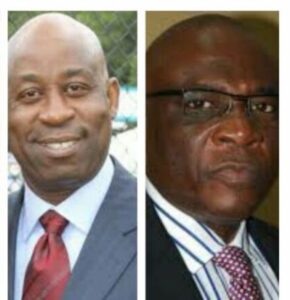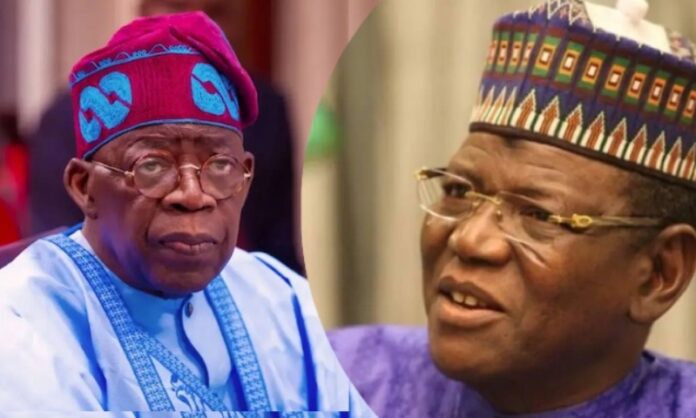Presidential spokesman, Mr Bayo Onanuga and the minister of minister of solid minerals development, Mr Dele Alake, have separately unleashed scathing attacks on the former governor of Jigawa State, Mr Sule Lamido for alleging that President Bola Tinubu supporting the annulment of June 12, 1993 election by then military president, General Ibrahim.
Recall that Tinubu had in a recent interview on Arise News accused the president of being part of those who supported Babangida’s annulment of the election that received both local and international acclaim.
He said he was entertained by the way Tinubu dramatised his (Tinubu’s) role in the country’s democracy during the Democracy Day celebration to commemorate the annulment of the election.
“His own mother Hajia Mogaji was organising Lagos market women to come to Abuja to pledge support for Babangida.”
“I feel highly entertained by Tinubu’s rhetoric, the way he’s dramatising his role in Nigeria’s democracy. Tinubu became relevant and noticeable after Abacha took over the government; before then, he was in the senate while he was the secretary of the party.’’
“Tinubu was actively hand-in-glove with Babangida. NADECO was a postulation formation to fight Abacha not for June 12,” Lamido stated adding that the National Democratic Coalition (NADECO), formed in 1994, was to fight Abacha’s regime, rather than advocate for the validation of the June 12 election.
Replying Lamido in a release entitled ‘Setting the record straight: President Tinubu’s role in the June 12 struggle,’ Onanuga said Lamido’s claim that Tinubu and his mother, the late Mrs Abibatu Mogaji supported the annulment of the election as false, a distortion of history and a regrettable attempt at revisionism.
He said there was no doubt about Tinubu’s credential as a steadfast advocate for democracy, in contrast to Lamido, who, “as secretary of the Social Democratic Party (SDP) — the party whose candidate, MKO Abiola, won the June 12 election — was among those who failed to oppose the military’s injustice.”
Onanuga added: “The SDP leadership, including Lamido and chairman, Tony Anenih, wrote their names in the book of infamy by surrendering the people’s mandate without resistance. To their eternal shame, Lamido and Anenih teamed up with the defeated National Republican Convention to deny Abiola his mandate.”
The statement reads: “The attention of the Presidency has been drawn to recent comments made by Alhaji Sule Lamido, former Governor of Jigawa State, on live television, in which he falsely accused President Bola Tinubu of supporting the annulment of the June 12, 1993, presidential election.
“Alhaji Lamido’s claims represent a distortion of history and a regrettable attempt at revisionism.
“He alleged that President Tinubu only rose to prominence after the formation of NADECO and claimed that Tinubu’s mother, Alhaja Abibatu Mogaji, mobilised market women to back the annulment. These allegations are patently false.
“Let us set the record straight: Alhaja Mogaji never mobilised market women to support the unjust annulment. Had she done so, she would have lost her position as market leader in Lagos. While she once had a personal relationship with then-President Babangida, this was before the annulment crisis.
“It is important to remind Nigerians that Alhaji Lamido, as secretary of the Social Democratic Party (SDP) — the party whose candidate, MKO Abiola, won the June 12 election — was among those who failed to oppose the military’s injustice.
“The SDP leadership, including Lamido and chairman, Tony Anenih, wrote their names in the book of infamy by surrendering the people’s mandate without resistance. To their eternal shame, Lamido and Anenih teamed up with the defeated National Republican Convention to deny Abiola his mandate.
“In sharp contrast, Senator Bola Tinubu stood firm even before General Abacha dissolved the political parties and all democratic institutions, including the National Assembly, on 17 November 1993, following his coup.
“Days after General Babangida addressed the Senate and announced his decision to step aside on 27 August 1993, and the setting up of an interim government to replace him, Senators debated the speech. On the Senate floor on 19 August 1993, Tinubu unequivocally condemned the annulment, describing it as another coup d’état and urging Nigerians to reject injustice and lawlessness.
“The records captured his contribution, showing that he supported upholding the June 12 election, not against it, as Lamido claimed.
“We have a situation that suggests that the abortion of the June 12 election is another coup d’état,” Senator Tinubu said. “My question is, when are we going to stop tolerating injustices, coup d’état and abuse by the people on whom we invested so much resources — the public funds of this country? … Yes, it is true that we have a crisis, but for every action, there must be a reaction.
“This is a self-inflicted crisis because, without the abortion or annulment of the June 12 election, there would be no crisis like this. We have a government that made the law and abused its law.
“Therefore, the present military administration, by virtue of abrogation and violation of its own decree, has committed a crime,” the Senator from Lagos West told his colleagues.
“The election winner, Abiola, was out of the country when the legislators debated Babangida’s offer to step aside for an interim government. He returned in September 1993. And who followed him to the Abacha military group, then openly planning a coup against the Ernest Shonekan-led ING? It was Tinubu. Photographs exist today, showing Tinubu behind Abiola and Abacha.
“Abacha took over on 17 November 1993, and dissolved all democratic institutions, including governors, the National Assembly, and the state legislature. Tinubu and a group of senators reconvened in Lagos, defying the junta. Tinubu, Ameh Ebute, Abu Ibrahim, and others were arrested and kept at Alagbon. The police took them to court and fabricated a case against them. While in police detention, Tinubu continued to fund pro-June 12 protests in Lagos, including the blockade of the Third Mainland Bridge.”
“Weeks after Abacha supplanted the ING, it quickly became clear to Abiola and Tinubu that Abacha would not be a soldier of democracy as he reneged on allowing Abiola to reclaim his mandate.
“Enter the National Democratic Coalition (NADECO). It was born on 15 May 1994. Comprising a broad coalition of Nigerian democrats, it called on the military government of Sani Abacha to step down in favour of the winner of the 12 June 1993 election, MKO Abiola.
“On the first anniversary of his election, Abiola made a declaration at Epetedo in Lagos, announcing himself as the duly elected president. Ten days later, on 22 June, he was arrested, following which many pro-democracy activists also escaped from Nigeria, including Bola Tinubu.
“Tinubu lived in exile for nearly five years while Lamido and his ilk made deals with Abacha. While Tinubu was away, agents of the junta bombed his home on Balarabe Musa Crescent, Victoria Island.
“Thankfully, Lamido admitted that Tinubu played a significant role in NADECO. Indeed, Tinubu did more. He also backed Professor Wole Soyinka’s NALICON, offering material resources to fuel the struggle.
“It is well-known that Tinubu played a leading role in the agitation against the June 12 annulment. Many NADECO leaders and journalists in exile and at home openly admitted that Tinubu sustained them and provided them with funds for the struggle.
“With his narrative, Lamido appeared confused about the role of NADECO. It was an offshoot of the June 12 crisis. NADECO provided a platform to channel the struggle. Hitherto, all the resistance was left to civil rights groups, journalists, and a section of labour, such as NUPENG.
“It is thus disappointing that Alhaji Lamido, despite acknowledging Tinubu’s NADECO role, would attempt to rewrite history for political reasons and as a member of the Coalition of the Disgruntled.
“We advise Lamido to check his facts before going on television to spread falsehoods. It does not help his image, and the coalition he belongs to engages in revisionism. Revisionism does not serve the cause of truth or our nation’s interests.

“We do not want to believe that Alhaji Lamido suffers from what psychologists call ‘tall poppy syndrome’. However, the conclusion is inevitable, as it appears that Lamido is envious of Tinubu’s democratic credentials. The facts remain clear: President Tinubu was — and remains — a steadfast advocate for democracy, in contrast to the record of Lamido and others who capitulated in the face of military oppression and intimidation.”
Similarly, Alake, described Lamido’s allegations as appalling, saying the former governor was suffering from memory loss.
Speaking on Arise News, Alake also disproved Lamido’s assertion that Tinubu sold out during the June 12 poll and that Tinubu’s and Mogaji mobilised market women to throw their support for Babangida
He accused Lamido of being one of the figures who sustained the annulment of the election
“I feel very appalled at his own submissions, which I would ascribe largely to selective amnesia at best, or at the very worst, an impairment of the medulla oblongata, due to some atrophy of age, or memory loss in layman’s terms.
“Now, Sule Lamido himself was the guilty party to the sustenance of the annulment of that June 12th election. And before I go on, let me establish the basis for my authoritative submission on this issue.
“Everybody knows I was the editor of Sunday Concord, which was owned by MKO Abiola, who won the election. And what most people didn’t know, including Sule Lamido, was that the very first public statement of MKO Abiola to the entire world of his intention to even run for office in January of 1993, I wrote it. I wrote that statement, and I advertised it in all Nigerian newspapers and all Nigerian television stations,” Alake said.
Alake added that it smacked of gross revisionism for Lamido to say that Tinubu supported the annulment of the June 12 mandate.
He stressed that Tinubu was with Abiola before, during and after the June 12 election.
The minister added that Lamido was only trying to cover the unenviable role he played in the June 12 saga.
Besides, Alake said even when Tinubu was behind bars, he was still funding the movement against the military.
“Tinubu was one of the funders and one of the organisers, one of the planners of all the protests, July 23, 24, 25 of 1993 against the annulment. This was way before Abacha. Abacha did not come until November 17, 1993,’’ he maintained.
He noted that Tinubu also escorted Abiola MKO to go and see Abacha to negotiate how Abacha would relinquish office
“If Tinubu was working for Abacha, how would he be doing that? How would he be confronting Abacha frontally that he was in detention. And in fact, there was a time they issued a directive that he must be found, he must be brought in dead or alive.
“It was at that point he had to leave through the famous NADECO route. The Abacha goons were all over looking for him. And I remember that. So that was the reason that he left. So he didn’t run away,” Alake stated in his defence of the president,” Alake said.






















































